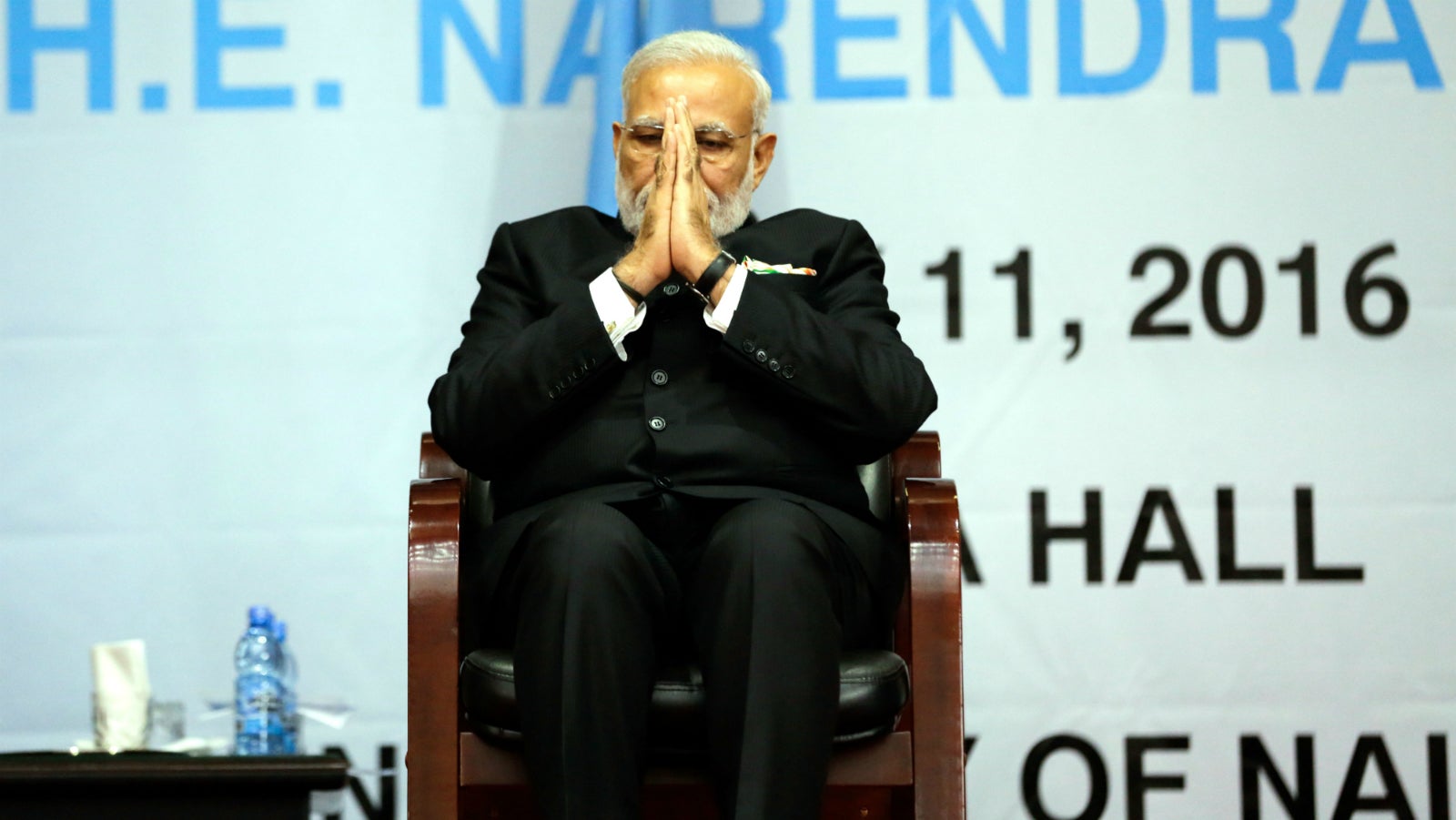Narendra Modi’s brotherly words for Dalits make his silence on Muslims ring louder
India’s hyper-communicative prime minister is known to keep his lips sealed on the misdeeds of his Hindu nationalist fellow-travellers.


India’s hyper-communicative prime minister is known to keep his lips sealed on the misdeeds of his Hindu nationalist fellow-travellers.
Last weekend, he made a departure in light of the brutality in his home state, Gujarat, where self-styled cow protectors flogged seven Dalits who were skinning a dead cow on July 11.
“If you have a problem, if you feel like attacking someone, attack me, not my Dalit brothers,” Narendra Modi said, almost a month after the incident. Such groups, Modi claimed, make him “very angry.” “If you want to shoot anyone, shoot me, not my Dalit brothers,” he declared while speaking in the southern Indian city of Hyderabad on Aug. 07.
A day earlier, asking state governments to prepare dossiers on such vigilantes, Modi said 70-80% of these groups comprised “anti-social elements” using cow protection as a cover.
This rearguard action may not have been needed if Modi had spoken up earlier when Muslims were being killed—not just flogged—by a similar set of thugs.
Not surprisingly, “shoot me instead” is not how he responded then.
“The Dalits are ours, not Muslims”
In September 2015, a mob in Dadri, an hour’s drive from Delhi, lynched 52-year-old Mohammed Akhlaque on suspicion of eating cow meat.
Like with the Una incident, it took Modi many days to comment. After Indian president Pranab Mukherjee reiterated the need for tolerance and the furious national debate failed to die a natural death, the prime minister, during an election speech in Bihar, finally touched upon the need for communal harmony.
“I have said it earlier too. Hindus should decide whether to fight Muslims or poverty. Muslims have to decide whether to fight Hindus or poverty. Both need to fight poverty together,” Modi said, without even referring to the tragedy in Dadri or cow-protection vigilantism in general.
A week later, in an interview with a Bengali newspaper, Anandabazar Patrika, Modi spouted cliches like “unfortunate” and “unwarranted” to describe Akhlaque’s killing and said while the incident saddened him, he couldn’t be held responsible. As the matter concerned the state government, he accused the opposition of trying to earn political mileage out of the incident.
It didn’t matter to him that the accused in Akhlaque’s lynching were associated with his Bhartiya Janata Party. Nor was he outraged at his own ministerial colleagues trivialising the incident.
The Akhlaque incident wasn’t an isolated one.
Such vigilantes have been assaulting Muslims increasingly often. On July 30, a mob in Muzaffarnagar in the northern Indian state of Uttar Pradesh (UP) attacked the house of a Muslim family over cow slaughter. On July 26, a mob at a railway station in central India’s Madhya Pradesh state beat up two Muslim women suspected to be carrying beef. On March 18, two Muslim cattle traders were killed and hanged from a tree in Jharkhand state, neighbouring UP. Last October, a suspected cattle-smuggler—again, a Muslim—was lynched in Himachal Pradesh.
At least four Muslim deaths in the name of the cow within a year and Modi was blaming state governments.
Contrast that with how the recent Dalit protests have prompted him to appeal to state governments to crack down on vigilantes.
The impact of the prime minister’s stand was instantly evident. The police in Delhi and Punjab have swung into action and the BJP’s ideological parent, the Rashtriya Swayamsewak Sangh, has spoken up against vigilantes.
So, better late than never. However, the fact that Modi is “angry” about the Dalits’ flogging and not just “saddened”—as he was after Akhlaque’s killing—demonstrates how little India’s Muslims mean to him and his BJP.
Modi needs Dalit votes in the upcoming elections in critical states like UP and Punjab, but his BJP does not even pretend to woo the Muslims. Hindu nationalism is open to reconciling with the Dalits to create a larger Hindu political identity—Muslims have no place in that universe.
In short, Modi’s words of concern for Dalits, while appreciated, make his silence for Muslims ring louder.